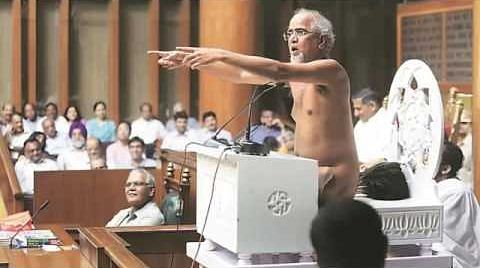Chief minister Khattar’s comments echoed the views of the Sanyukt Hindu Sangharsh Samiti, whose thugs have been disrupting namaz in recent weeks.
I personally dislike religious processions of any kind immensely. Any juloos, visarjan, jagrata, or mass — an overt expression of faith that obstructs civilian life and stresses our already stretched resources — is a sham and should be banned. The idea of ritualised, public show of religious fervour is to me, an atheist, just an annoyance and disturbance. The environmental impact of many of these displays makes me baulk because of the sheer amount of waste they produce. If I had my way, religion would be a personal matter kept inside homes.
But my personal views mean absolutely nothing in a country envisioned to be far more tolerant than my narrow capacities. The chief minister of Haryana, however, is at the helm of a state constantly teetering at the edge of absolute chaos. Haryana’s patriarchal, casteist society has been in the news for many, many years now. Clearly, a cruel, communal side of it has decided to rear up its head too.
When Khattar said that namaz should be offered only in mosques or Idgahs, he seemed to echo the views of the Sanyukt Hindu Sangharsh Samiti, an umbrella organisation for Hindu outfits. In the past two weeks, thugs from the said outfit have been disrupting namaz.
Their four-point demands include: permission should not be given for namaz in Hindu colonies, sectors and neighbourhoods; permission should only be given in those places where the strength of the Muslim population is more than 50 per cent.
BJP minister Anil Vij added another lovely facet by saying that namaz for ‘land-grabbing’ cannot be allowed.
Unlike my right-wing friends, I try not to indulge in whataboutery. So, I won’t point out the ruckus Kanwaria Yatra causes every year, or how the waters around Mumbai are muddied and ruined every Ganpati visarjan. I will, instead, go back to the Constitution. Article 25 says all people of India have ‘freedom of conscience and free profession, practice and propagation of religion, subject to public order, morality and health.’ Considering Muslims have been offering namaz for years without a hitch now, how did it suddenly become a problem?
Let’s also go back two years to 2016, when Jain seer Tarun Sagar spent 40 minutes in the Haryana assembly… in the nude. If that comes under the ambit of the religious freedoms afforded to Indians (separation of state and religion is clearly something we will never learn), how can peaceful prayers not?
Coming to the ‘demands’ of the Sanyukt Hindu Sangharsh Samiti, which Khattar’s remarks gave extremely open validation to, the aim seems fairly transparent. If a Hindu-majority area has a few Muslims living in it, it can coerce them into hiding, and possibly, eventually leaving. The sheer impossibility of renting accommodation in India as a minority is fairly well established and nothing new. The new unwritten urban consensus, however, allows these biases and denials to be far more obvious, virulent, and violent.
This isn’t an isolated situation, though. Across the country, latent hatred towards minorities has seen an incredible unveiling since 2014. Even if the ruling party hasn’t incited new waves of animosity, it has given legitimacy to the ones that have existed under the veneer of civility. While people may argue that the rates of targeted crimes against minorities haven’t changed immensely over the years, the silence, and the resulting implied approval cannot be ignored anymore. The current governance structures of this country have gorged themselves on the terrible forces they have unleashed on the minorities. The Indian state has never been too kind to them, but the apathy we see now is not just saddening, it is scary.
This fear, in part, also stems from the government’s comfort with self-styled lawmen like those who have been disrupting namaz in the jurisdiction. When six men were arrested, the Sanyukt Hindu Sangharsh Samiti took out a procession demanding their release and a ban on namaz in public places. The government, by not putting out strong statements against such thugs, is both hampering the executive’s ability to maintain law and order, and leaving already vulnerable minorities out cold.
The last few years have seen immense ‘othering’ and misdirected anger against most minorities, but Muslims have faced the brunt of this. Every single crime against Muslims devolves into the tired ‘but they are not Indians and this is not their country’ spiel. Wrong. This is very much their country, and they are Indians. However, by making clear that legal recourse means nothing in front of majoritarian demands, the government makes its stance clear — and it’s not one this country will survive.
Jay-Z’s ‘No Church In The Wild’ comes to mind whenever I think of religious violence, especially the forms it’s taking in India today: ‘Human beings in a mob/What’s a mob to a king?/What’s a king to a god?/What’s a god to a non-believer?/Who don’t believe in anything?’
In a world where the government, instead of being a force of peace and mediation, stokes communal anger to its own benefits, maybe it’s the rationalists, the non-believers, the skeptics who will save the day. Our voices aren’t very loud, and often drowned out (like M.M. Kalburgi’s), but they’re the only ones that seem to offer some solace in a world where faith has become a weapon.
Harnidh Kaur is a poet and feminist.
इस लेख को हिंदी में पढ़ें: एक दिगंबर जैन मुनि हरियाणा विधानसभा में बोल सकते हैं पर मुस्लमान खुले में नमाज़ नहीं पढ़ सकते ?



